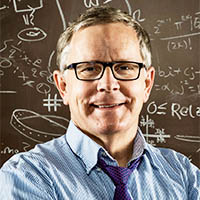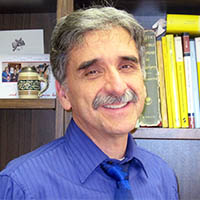By Michael Dorff and Scott A. Wolpert
2012 saw an uproar over collegiate-level mathematics. The President’s Council of Advisors on Science and Technology (PCAST) reported to then-President Barack Obama that “introductory mathematics courses often leave students with the impression that all science, technology, engineering, and mathematics (STEM) fields are dull and unimaginative, which has particularly harmful effects for students who later become K-12 teachers” [1]. They also advocated for “college mathematics teaching and curricula developed and taught by faculty from mathematics-intensive disciplines other than mathematics, including physics, engineering, and computer science” [1]. Multiple groups within the mathematical science community responded to this controversial PCAST report. For example, SIAM affirmed that “Collaboration, rather than removing mathematicians from the education equation, will ensure that students have access to relevant and exciting learning experiences with appropriate breadth and depth” [2].
Unsurprisingly, the situation provoked numerous discussions among both pure and applied mathematicians. Concerns over the demand for stronger quantitative skills in the workforce inspired a small gathering of individuals from the mathematics community, higher education more broadly, and beyond. This meeting took place at the Carnegie Corporation of New York (CCNY) and led directly to the formation of Transforming Post-Secondary Education in Mathematics (TPSE Math), which received initial funding from CCNY and the Alfred P. Sloan Foundation. Members of the initial action team included Phillip Griffiths (Institute for Advanced Study), Mark Green (University of California, Los Angeles), Uri Treisman (University of Texas at Austin), and Eric Friedlander (University of Southern California).
The TPSE vision is a postsecondary mathematics education that will enable all students—regardless of their identities, backgrounds, or chosen programs of study—to develop the modern mathematical knowledge and skills to productively engage in society and the workplace. TPSE Math aims to foster a mathematically rich and relevant education for every student, and to work with mathematicians, faculty, administrations, and professional organizations like SIAM to facilitate an inclusive movement that strengthens postsecondary education in mathematics. The current Board of Directors consists of Griffiths, Green, Friedlander, William Kirwan (University of Maryland), Sylvester James Gates, Jr. (Brown University and University of Maryland), Tara Holm (Cornell University), Karen Saxe (American Mathematical Society), Uri Treisman, and Suzanne Weekes (executive director of SIAM).
TPSE Math hosts a multitude of activities and programs. Here we highlight two such initiatives: the Leadership Institute and Creating Opportunities in Mathematics through Equity and INclusion (COME-IN).
Nan Sattler (Terra Community College) leads a discussion about conflict management during a meeting of the Leadership Institute Fellows.
The Leadership Institute
In school, mathematicians learn how to solve mathematics problems and conduct research. However, few receive formal training on leading a team, department, or organization — even when they are promoted to leadership positions. To address this disparity, TPSE created the Leadership Institute: a year-long program to help mathematicians learn leadership skills and develop their ability to act as leaders at their respective institutions, professional organizations, and federal agencies. The Institute encourages participation from underrepresented groups and recognizes that the mathematics community can benefit from the experience and insight of leaders from diverse backgrounds. Each Fellow in the Leadership Institute (i) receives leadership training via a two-day, in-person summer workshop and bi-monthly virtual group meetings, (ii) works on a self-selected leadership project during the year, and (iii) is matched with a mentor who is an experienced leader.
One interesting component of the Leadership Institute is that all Fellows design their own projects to gain further leadership experience. For instance, Nathan Alexander (Morehouse College) is developing a community data hub that examines, communicates, and advocates for more justice-oriented data practices, while Dandrielle Lewis (High Point University) is creating a summer program that focuses on mentoring and mathematically training Black, Hispanic, and Indigenous students.
Mentors provide leadership advice and answer questions about the Fellows’ year-long projects and potential future leadership opportunities. For example, Green—who cofounded the Institute for Pure and Applied Mathematics—serves as a mentor to Jayadev Athreya (University of Washington), who is the director of the Pacific Institute for the Mathematical Sciences (PIMS) in Canada. Athreya spoke highly of Green, noting that he “has been a valuable source of advice and a great sounding board as I’ve worked on diversifying PIMS’ funding base and establishing a culture of diversity, equity, and inclusion in everything PIMS does.”
Creating Opportunities in Mathematics through Equity and INclusion
Erika Tatiana Camacho (Arizona State University and National Science Foundation)—a member of the Creating Opportunities in Mathematics through Equity and INclusion (COME-IN) working group—chats with Roberto Alvarez (middle) and Danielle Brager (right), then-students at Arizona State University. Photo courtesy of the authors.
Many departments and organizations within the mathematical sciences community want to improve their equity, diversity, and inclusion (EDI) efforts. However, resources that support such efforts are scarce — especially ones that are specifically tailored to mathematics and statistics. To address this deficit, TPSE Math convened a diverse working group of 16 mathematicians to create resources that can guide a mathematical and statistical sciences department in assessing and enhancing its EDI endeavors. The working group adapted core criteria from the American Association for the Advancement of Science’s
STEMM Equity Achievement (SEA) Change initiative to the specific needs of the mathematical and statistical sciences, ultimately resulting in the resources that comprise COME-IN. We are now actively promoting and distributing COME-IN to departments and organizations in the mathematics and statistics communities.
The COME-IN tools consist of a set of reflective questions about recruitment, evaluation, and mentoring that relate to students, faculty, and staff. They include considerations and issues of which leaders might be unaware as they work to assess and improve their EDI efforts. The tools are also self-guided; department leaders identify their priorities, collect data, and develop action plans to address the problems at hand. Some sample questions are as follows:
- What supports are available to ensure that students who start with entry-level courses can be successful in mathematics and statistics majors or other STEM majors?
- Are advisors trained to respond to cultural differences?
- How do the demographics of students who take advantage of certain opportunities compare with the overall undergraduate population?
- Does the department offer programs that prepare students for success in the workforce or graduate studies?
- How does the department assess the effectiveness of student placement in required courses and ensure continuous improvement?
TPSE Math is supported by CCNY and National Science Foundation grants from the Division of Undergraduate Education and Division of Mathematical Sciences. Read more about TPSE and its various programs online.
References
[1] President’s Council of Advisors on Science and Technology. (2012). Engage to excel: Producing one million additional college graduates with degrees in science, technology, engineering, and mathematics (Report to the President). Washington, D.C.: Executive Office of the President.
[2] SIAM responds to PCAST report. (2012, July 17). SIAM News, 45(6), p. 6.
 |
Michael Dorff is a professor of mathematics at Brigham Young University and the Director of Strategy and Implementation at TPSE Math. |
 |
Scott A. Wolpert is a professor emeritus of mathematics at the University of Maryland and a Senior Consultant at TPSE Math. |